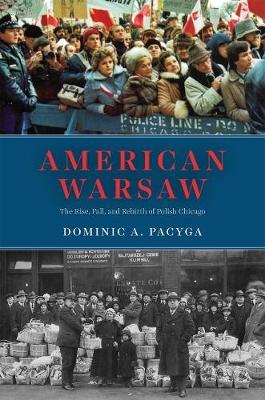American Warsaw

American Warsaw
With American Warsaw, award-winning historian and Polish American Dominic A. Pacyga chronicles more than a century of immigration, and later emigration back to Poland, showing how the community has continually redefined what it means to be Polish in Chicago. He takes us from the Civil War Era until today, focusing on how three major waves of immigrants, refugees, and fortune seekers shaped and then redefined the Polonia. Pacyga also traces the movement of Polish immigrants from the peasantry to the middle class and from urban working-class districts dominated by major industries to suburbia. He documents Polish Chicago's alignments and divisions: with other Chicago ethnic groups; with the Catholic Church; with unions, politicians, and City Hall; and even among its own members. And he explores the ever-shifting sense of Polskosc, or "Polishness."
Today Chicago is slowly being eclipsed by other Polish immigrant centers, but it remains a vibrant--and sometimes contentious--heart of the Polish-American experience. American Warsaw is a sweeping story that expertly depicts a people who are deeply connected to their historical home and, at the same time, fiercely proud of their adopted city. As Pacyga writes, "While we were Americans, we also considered ourselves to be Poles. In that strange Chicago ethnic way, there was no real difference between the two."
PRP: 190.40 Lei
Acesta este Pretul Recomandat de Producator. Pretul de vanzare al produsului este afisat mai jos.
171.36Lei
171.36Lei
190.40 LeiIndisponibil
Descrierea produsului
With American Warsaw, award-winning historian and Polish American Dominic A. Pacyga chronicles more than a century of immigration, and later emigration back to Poland, showing how the community has continually redefined what it means to be Polish in Chicago. He takes us from the Civil War Era until today, focusing on how three major waves of immigrants, refugees, and fortune seekers shaped and then redefined the Polonia. Pacyga also traces the movement of Polish immigrants from the peasantry to the middle class and from urban working-class districts dominated by major industries to suburbia. He documents Polish Chicago's alignments and divisions: with other Chicago ethnic groups; with the Catholic Church; with unions, politicians, and City Hall; and even among its own members. And he explores the ever-shifting sense of Polskosc, or "Polishness."
Today Chicago is slowly being eclipsed by other Polish immigrant centers, but it remains a vibrant--and sometimes contentious--heart of the Polish-American experience. American Warsaw is a sweeping story that expertly depicts a people who are deeply connected to their historical home and, at the same time, fiercely proud of their adopted city. As Pacyga writes, "While we were Americans, we also considered ourselves to be Poles. In that strange Chicago ethnic way, there was no real difference between the two."








